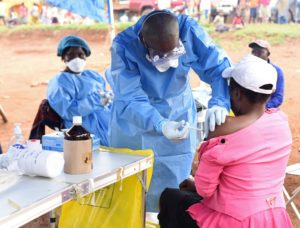Accra, Ghana, May 24, 2019//-A vaccine according to the “Oxford Advanced Learner’s Dictionary” is a substance that is put into the blood and protects the body from a disease.
Already in use are vaccines for what the World Health Organization (WHO) calls the six childhood killer diseases – polio, diphtheria, whooping cough, tetanus, measles, and tuberculosis.
The introduction of the RTS, S or Mosquirix – an injectable vaccine meant to protect children from malaria has, however, brought ripples on the health plane of the country. Many Ghanaians were and still filled with trepidation as to the side effects of the vaccine.
On social media lots have been written by antagonists of the RTS,S about the other side of the vaccine while the WHO and the Government of Ghana through the Ministry of Health have been on defensive with the plusses of the vaccine and on offensive with its promotion.
According to the WHO every year, malaria claims the lives of more than 400 000 people with children under the age of five in sub-Saharan Africa more vulnerable, accounting for about two thirds of all global deaths due to malaria
Touting it as a new tool with promise for Africa the Organization says the RTS,S acts against Plasmodium Falciparum, the most deadly malaria parasite globally and the most prevalent in Africa.
The vaccine provides partial protection against malaria among young African children, the population most affected by the disease. Rigorous clinical testing in seven African countries has shown its potential to boost malaria prevention and save lives.
“RTS,S is the first and, to date, the only vaccine to show partial protection against malaria in young children. Among children who received four doses in a large-scale clinical trial, the vaccine prevented approximately 4 in 10 cases of malaria and 3 in 10 cases of life-threatening severe malaria over a four-year period”, it says..
Additionally, WHO explains that the “RTS,S is the first, malaria vaccine to receive a positive review by a stringent regulatory agency In July 2015, the European Medicines Agency (EMA) issued a positive scientific opinion of RTS,S, stating that the benefits of the vaccine in preventing malaria outweigh potential risks
On the efficacy of the RTS,S the it states that, “The Phase 3 trial, conducted over 5 years (from 2009 to 2014), enrolled approximately 15 000 young children and infants in 7 sub-Saharan African countries.
The trial sites within these countries represented a range of malaria transmission settings. Among children aged 5–17 months who received 4 doses of RTS,S, the vaccine prevented approximately 4 in 10 (39%) cases of malaria over 4 years of follow-up and about 3 in 10 (29%) cases of severe malaria,3 with significant reductions also seen in overall hospital admissions as well as in admissions due to malaria or severe anaemia.
The vaccine also reduced the need for blood transfusions, which are required to treat life-threatening malaria anaemia by 29%.”
Dr. Anthony Nsiah-Asare, Director General of the Ghana Health Service, calming nerves at a press briefing, explained that the vaccine was an additional intervention to accelerate Ghana’s efforts towards controlling and eliminating malaria.
He made it clear that from the various trials conducted on the vaccine it has been observed to have a very good safety profile, good efficacy and impacted positively on the health of children.
The Health Ministry says the vaccine is a complementary malaria control tool – to be added to the core package of WHO-recommended measures for malaria prevention, that includes the routine use of insecticide-treated bed nets, indoor spraying with insecticides, and the timely use of malaria testing and treatment.
The pilot programme includes areas of Central, Oti, Bono, Bono East, Ahafo and Volta regions and some districts in Upper East region. Within these regions, some districts are receiving the vaccine, while others are expected to receive the vaccine at a later date. The remaining districts and regions are continuing to benefit from other malaria control measures implemented nationwide.
Ghana is one of the three African countries in which the vaccine is being made available to children up to 2 years of age. The other two countries are Kenya and Malawi.
By Oppong Baah, African Eye Report



